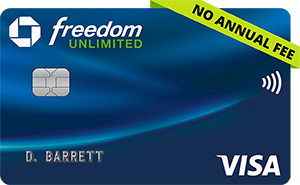Chase Freedom Unlimited vs. Capital One Venture Card: Which One Is Right for You?

The Chase Freedom Unlimited® and Capital One Venture Rewards Credit Card are among the best rewards credit cards on the market. Each offers a welcome bonus, generous earning rates on everyday purchases, and useful travel and purchase protections.
Beyond that, the cards have significant differences you’ll want to consider before choosing one over the other. The Freedom Unlimited, for instance, doesn’t have an annual fee, while the Venture Card charges $95 a year. Redemption options and perks vary, too.
Let’s take a closer look at the Capital One Venture vs. Chase Freedom Unlimited to help you decide which is better for you.

400+ Credit Cards
Analyzed independently across 50+ data points in 30+ product categories

Reviewed
By a team of credit card experts with an average of 9+ years of experience

Trusted by
More than one million monthly readers seeking unbiased credit card guidance
CardCritics™ editorial team is dedicated to providing unbiased credit card reviews, advice and comprehensive comparisons. Our team of credit card experts uses rigorous data-driven methodologies to evaluate every card feature, fee structure and rewards program. In most instances, our experts are longtime members or holders of the very programs and cards they review, so they have firsthand experience maximizing them. We maintain complete editorial independence — our ratings and recommendations are never influenced by advertiser relationships or affiliate partnerships. You can learn more about our editorial standards, transparent review process and how we make money to understand how we help you make informed financial decisions.
How the Cards Compare: Chase Freedom Unlimited vs. Capital One Venture
Annual Fee
Purchase and Balance Transfer APR
Welcome Bonus
Ongoing Rewards
Earn unlimited 2X miles on every purchase, every day.
Pros & Cons
- Higher than average base rate of 1.5%
- Elevated 3-5% cash back on select categories
- Valuable bonus opportunity
PROS
- No ability to transfer points to travel partners unless you have an eligible annual-fee Chase card
- Charges a foreign transaction fee
CONS
- No foreign transaction fee
- Double miles earned on every purchase
- Travel perks like Global Entry or TSA PreCheck® Credit
PROS
- No introductory APR offer
- Limited hotel transfer partners
CONS
Learn More
Welcome Bonuses
No-annual-fee cards like the Chase Freedom Unlimited typically offer modest welcome bonuses compared to annual-fee travel credit cards like the Capital One Venture Card, and that’s certainly the case here.
Chase Freedom Unlimited Welcome Bonus
With the Freedom Unlimited, you can earn a $200 bonus after you spend $500 on purchases in the first three months of account opening. That’s a manageable spending requirement for most users, since $500 in three months translates to just $167 per month.
New cardholders can also take advantage of a 0% Intro APR on Purchases and Balance Transfers for 15 months, then 18.24% - 27.74% Variable. A 0% APR credit card can save you a ton of cash if you have purchases you can’t pay off all at once, or if you’re looking to transfer a balance from a high-interest credit card.
Capital One Venture Welcome Bonus
The Capital One Venture Card has a LIMITED-TIME OFFER: Enjoy $250 to use on Capital One Travel in your first cardholder year, plus earn 75,000 bonus miles once you spend $4,000 on purchases within the first 3 months from account opening - that’s equal to $1,000 in travel. That’s a much higher spending threshold than the Freedom Unlimited, but it’s certainly attainable if you put all of your day-to-day purchases on the card — an average of $1,334 a month.
When I opened the Venture Card, I timed my application in advance of a few big expenses I had coming up, like camp fees, a summer vacation and back-to-school shopping. This made it easy to reach the spending requirement without stressing too much about the three-month deadline.
The 75,000-mile bonus is worth a cool $750 in travel booked through Capital One or charged to your card and “erased” with miles. And it’s possible to get an even higher value if you transfer miles to Capital One’s airline and hotel partners to book award travel. That’s not even counting the $250 Capital One Travel credit.
CardCritics™ Opinion
The Capital One Venture Card has far and away the more valuable welcome offer. However, it requires much more spending to unlock its bonus — $4,000 within three months, compared to the Freedom Unlimited’s $500 in the same time frame.
If you can’t comfortably meet the spending requirement for the Venture Card’s bonus with your everyday expenses, go for the Freedom Unlimited instead.
Earning Rewards
Choosing the right credit card for your lifestyle hinges partly on your spending habits. If you have high expenses in certain categories, a card that earns bonus rewards on those purchases can help you earn more quickly. But if your spending is spread across many different categories, a card that earns a high flat rate of rewards on all purchases could be a better deal.
How To Earn Rewards With Chase Freedom Unlimited
The Chase Freedom Unlimited is marketed as a cash-back credit card, but it actually earns Chase Ultimate Rewards® points, which can be used for cash back and other redemptions. The card earns at the following rates:
- 5% cash back (5x points) on Chase Travel℠ purchases
- 3% cash back (3x points) at restaurants (including takeout and delivery)
- 3% cash back (3x points) at drugstores
- 1.5% cash back (1.5x points) on all other purchases
Typically, rewards cards earn 1% or 1x points on non-bonused spending, so the Freedom Unlimited is above average, earning an unlimited 1.5% back on most purchases. Plus, if you frequently dine out or shop at drugstores, using the card can accelerate your rewards earning in those categories. I spend a fair bit at CVS and always use my Freedom Unlimited to earn 3% back on those purchases — it adds up pretty quickly.
How To Earn Rewards With Capital One Venture Card
The Capital One Venture Card takes a simpler approach. It earns a flat 2x Capital One miles on most purchases, with a couple of exceptions: hotels, vacation rentals and rental cars booked through Capital One Travel earn 5x miles, as do Capital One Entertainment purchases.
This type of earning structure is appealing if you don’t want to remember bonus categories or worry about which card to use in each situation. It makes the Venture Card a great daily driver or a catch-all card for purchases that don’t earn a bonus with other cards. For instance, this is my go-to card for expenses such as veterinary and medical bills, car repairs and insurance payments.
CardCritics™ Opinion
It’s a toss-up between the Venture Card and Freedom Unlimited when it comes to earning rewards. Both cards have an above-average base rewards rate, so you’ll want to examine your spending patterns to see which is the better fit.
Redeeming Rewards
Both the Capital One Venture Card and Chase Freedom Unlimited earn flexible rewards you can choose to redeem in various ways.
How To Redeem Rewards With Chase Freedom Unlimited
You’ve got a ton of options when redeeming Chase Ultimate Rewards points from the Freedom Unlimited, including:
- Cash back: Redeem points for cash back as a statement credit or bank deposit (1 cent per point)
- Purchase travel: Use points through Chase Travel to book flights, hotels, rental cars and more (1 cent per point)
- Gift cards: Purchase gift cards from dozens of merchants with your points (1 cent per point, although sometimes certain gift cards go on sale)
- Pay with points: Redeem your points at checkout with Amazon, Apple or PayPal (rate varies)
- The Shops at Chase: Use points to pay for merchandise through Chase’s retail site (1 cent per point)
Your points can become even more valuable if you also have certain annual-fee Chase credit cards that earn Ultimate Rewards, such as the Chase Sapphire Preferred® Card or Chase Sapphire Reserve®. You can move points from your Freedom Unlimited to one of these card accounts and take advantage of better redemption options.
These cards allow points transfers to Chase’s airline and hotel partners, such as United MileagePlus, World of Hyatt and Southwest Rapid Rewards. They also include Chase’s Points Boost feature, which gets you a higher rate of return on certain Chase Travel bookings.
I usually move points from my Freedom Unlimited to my Sapphire Preferred Card account and then transfer them to partners to book award travel. This way, I’m able to get a value of 2 or more cents per point, depending on the partner and redemption.
How To Redeem Rewards With Capital One Venture
With the Capital One Venture Card, you’ve got plenty of redemption methods as well, including:
- Capital One Travel: Use Capital One miles to book flights, hotels, rental cars and vacation rentals through Capital One Travel (1 cent per mile)
- Erase recent travel purchases: Redeem Capital One miles for a statement credit to offset eligible travel purchases made with your card in the last 90 days (1 cent per mile)
- Transfers to partners: Convert your rewards to miles or points with over 20 Capital One airline and hotel partners, including JetBlue TrueBlue, Wyndham Rewards and Air Canada Aeroplan (rate varies depending on partner and redemption)
- Gift cards: Use miles to buy gift cards from popular retailers like Walmart, Dunkin’, CVS and Lowe’s (rate varies, typically 0.8 to 1 cent per mile)
- Pay with miles: Use miles at PayPal and Amazon checkout to pay for your purchase (0.8 cents per mile)
- Cash back: Redeem miles for cash back as a statement credit or check (0.5 cents per mile)
- Experiences: Use miles for exclusive events, concerts, sporting events and theater tickets through Capital One Entertainment (redemption rates vary)
This is not the card to use if you prefer cash back, as the redemption rate is poor (consider one of the best cash-back credit cards instead). My favorite use of Capital One miles is redeeming them to erase travel charges from my statement; for example, this year I’ve redeemed miles for cruise gratuities, award flight taxes and fees, and train fare.
CardCritics™ Opinion
The Venture Card has the edge for redemptions, particularly since you can transfer miles to partners without needing to pair it with a pricier premium card. However, if you want the flexibility to use rewards for cash back, the Freedom Unlimited is the better pick, since the Venture Card’s cash back redemption rate is so poor (0.5 cents per mile).
Card Benefits
The Freedom Unlimited and Venture Card come with built-in benefits that can save you money, protect your purchases and cover you for certain travel mishaps.
Chase Freedom Unlimited Benefits
As a no-annual-fee card, you might expect Chase Freedom Unlimited benefits to be modest, but that’s not the case at all. Here’s what to expect:
- Trip cancellation and interruption insurance: Pay for your travel with the card and receive up to $1,500 per covered traveler and $6,000 per trip in reimbursement for prepaid, nonrefundable fares if your trip is interrupted or cancelled for a covered reason.
- Car rental insurance: When you pay for your rental and decline the rental agency’s collision insurance, you can be covered for damage due to theft or collision on most rental vehicles
- Travel and emergency assistance: Cardholders can access a hotline that assists with things like medical and legal referrals when away from home (the service is complimentary, but third-party costs are the responsibility of the cardholder)
- Purchase protection: Eligible items bought with your card that are stolen or damaged within 120 days of purchase (90 days for New York residents) can be covered up to $500 per item.
- Extended warranty: Pay for your purchase with the card, and you can receive a one-year extension of the eligible manufacturer’s US warranties of three years or less, up to four years from the date of purchase.
- Partner benefits: Receive six months of complimentary DoorDash DashPass membership, which normally costs $9.99 per month (activate by Dec. 31, 2027). Plus, DashPass members get up to $10 off quarterly on non-restaurant DoorDash orders through Dec 31, 2027. Cardholders can also earn 2% total cash back on Lyft rides through Sept. 30, 2027.
While the Freedom Unlimited isn’t one of the best credit cards for travel insurance, it’s nice to know that you’re covered in certain situations.
Capital One Venture Benefits
Capital One Venture benefits are more robust, with a range of credits, perks and travel protections that can justify its annual fee. You’ll receive:
- TSA PreCheck or Global Entry credit: Receive up to $120 in statement credits toward the TSA PreCheck or Global Entry application fee, once every four years.
- No foreign transaction fees: Some cards charge up to 3% in fees for international purchases, but the Venture Card does not.
- Car rental insurance: Pay for your rental with the card and decline the rental agency’s collision insurance, and you can be covered for damage due to theft or collision on most vehicles.
- Travel accident insurance: When you use the card to pay for your fare, you’ll receive automatic travel accident insurance for covered losses while traveling.
- Travel assistance services: Cardholders have access to a hotline that can assist with referrals and trip planning (third-party costs are the responsibility of the cardholder).
- Extended warranty: Pay for eligible items with your card, and you can qualify for additional warranty protection.
- Hotel perks: Book a hotel stay through Capital One’s Lifestyle Collection and receive room upgrades, early check-in and late checkout (subject to availability), plus a $50 experience credit on each booking.
- Hertz Five Star status*: Enroll to receive Hertz Five Star elite status, which lets you bypass the rental counter, choose from a wider range of cars and earn extra points on rentals.
- Capital One Café discount: Capital One credit cards, including the Venture Card, get you 50% off handcrafted drinks at Capital One Cafés.
My daughter used the card’s TSA PreCheck benefits when she signed up for the program earlier this year, and the statement credit toward the application fee was posted within about a week.
CardCritics™ Opinion
The Capital One Venture Card comes with a wider range of benefits than the Chase Freedom Unlimited, which is to be expected since annual-fee cards typically come with more perks. That said, the Freedom Unlimited is no slouch, offering competitive benefits for a no-annual-fee card.
Fees and Costs
While their annual fee difference is obvious, you may pay additional fees in certain situations with both cards.
Chase Freedom Unlimited Fees and Costs
Two things to highlight with the Freedom Unlimited beyond the lack of an annual fee are its generous introductory APR for new cardholders and the fact that it charges foreign transaction fees.
- Annual fee: $0
- APR: 0% Intro APR on Purchases and Balance Transfers for 15 months, then 18.24% - 27.74% Variable
- Balance transfer fee: Intro fee of either $5 or 3% of the amount of each transfer, whichever is greater, on transfers made within 60 days of account opening. After that: Either $5 or 5% of the amount of each transfer, whichever is greater.
- Cash advance fee: Either $10 or 5% of the amount of a transaction (whichever is greater)
- Foreign transaction fee: 3% of the amount of each transaction in U.S. dollars
- Late payment fee: Up to $40
- Returned payment fee: Up to $40
If you plan to travel abroad, leave the Freedom Unlimited at home and pack a card with no foreign transaction fees instead. While 3% doesn’t sound like much, it can add up fast. For example, if you spent $5,000 on the card while overseas, you’d end up paying $150 in extra fees.
Capital One Venture Fees and Costs
The Venture Card has similar costs, except it doesn’t offer an intro APR.
- Annual fee: $95
- Purchase APR: 19.49% - 28.49% (Variable)
- Balance transfer APR: 19.49% - 28.49% (Variable)
- Balance transfer fee: None for balances transferred at the transfer APR; 4% for promotional APRs that Capital One may offer you
- Cash advance fee: Either $5 or 5% of the amount of each cash advance, whichever is greater
- Late payment fee: Up to $40
Since it doesn’t charge foreign transaction fees, it’s a much better card for international travel.
CardCritics™ Opinion
If you’re looking to get some breathing room from interest with an introductory APR offer, the Chase Freedom Unlimited is the better pick here. However, if you plan to travel outside the US or make lots of purchases in foreign currency, the Capital One Venture Card wins for its lack of foreign transaction fees.
How To Choose Between Chase Freedom Unlimited and Capital One Venture Card
Choosing the right credit card for your needs isn’t a task to be taken lightly. In the case of comparing the Capital One Venture vs. Chase Freedom Unlimited, you’ll want to carefully examine your spending habits, redemption preferences and travel style before picking the best card for you. Here are a few scenarios to help your decision.
Frequent Travelers
If you’re constantly jetting off around the country or abroad, the Capital One Venture Card is worth it. With its lack of foreign transaction fees, application fee credit for Trusted Traveler programs, hotel and car rental perks, and ability to transfer miles to airline and hotel partners, it has a big advantage over the Freedom Unlimited.
Budget-Minded Consumers
Not everyone is willing to pay an annual fee, even if a card’s perks outweigh the cost. The Chase Freedom Unlimited is worth considering here, and it even packs in benefits you don’t always see on no-annual-fee cards. It’s also a better pick for those who want to consolidate high-interest credit card debt or pay off big purchases over time, since new cardholders receive a 0% Intro APR on Purchases and Balance Transfers for 15 months, then 18.24% - 27.74% Variable APR.
Rewards Maximizers
Those who enjoy squeezing the most value from their credit card rewards will probably do better with the Capital One Venture Card, since it lets you transfer rewards to airline and hotel partners. These types of redemptions can get you outsized value for your miles if you’re strategic. The Chase Freedom Unlimited only allows transfers when paired with an annual-fee Chase card like the Sapphire Preferred Card or Sapphire Reserve.
Cash-Back Enthusiasts
Using the Venture Card to earn rewards for cash back isn’t a great choice, because you’ll only get 0.5 cents per mile in value when you redeem this way. If you lean toward cash-back redemptions, go with the Freedom Unlimited — you’ll get a full 1 cent per point when you redeem for cash back.
For Capital One products listed on this page, some of the benefits may be provided by Visa® or Mastercard® and may vary by product. See the respective Guide to Benefits for details, as terms and exclusions apply.
*Upon enrollment, accessible through the Capital One website or mobile app, eligible cardholders will remain at that status level through the duration of the offer. Please note, enrolling through the normal Hertz Gold Plus Rewards enrollment process (e.g. at Hertz.com) will not automatically detect a cardholder as being eligible for the program and cardholders will not be automatically upgraded to the applicable status tier. Additional terms apply.
The information related to the Chase Sapphire Reserve® was collected by CardCritics™ and has not been reviewed or provided by the issuer of this product/card. Product details may vary. Please see issuer website for current information. CardCritics™ does not receive a commission for this product
Frequently Asked Questions About the Chase Freedom Unlimited vs Capital One Venture Card
Which card is easier to get, the Capital One Venture or Chase Freedom Unlimited?
Based on what we’ve seen, both the Freedom Unlimited and Venture Card likely require good to excellent credit to be considered — that is, a FICO score of 670 or higher. Each issuer will also look at additional factors, such as other cards you have and your overall financial situation, when it decides whether or not to approve you.
Who has better transfer partners, Capital One or Chase?
Chase has a smaller list of transfer partners than Capital One, but they’re often more friendly to travel rewards beginners with several domestic airline options, for example. You’ll need to pair a premium Chase card with the Freedom Unlimited to unlock points transferability, however. Capital One has more partners, but some are quite niche, and it lacks domestic airline transfer partners except JetBlue.
Should I get both the Capital One Venture Card and Chase Freedom Unlimited?
Sure! Pairing the Freedom Unlimited and Venture Card can help you maximize rewards and allow you to take advantage of different benefits. I have both cards and use them for different types of purchases, for instance.
Is the Chase Freedom Unlimited a travel credit card?
The Freedom Unlimited is framed more as a cash-back credit card, although it does have some travel perks. One of its big downsides is the 3% foreign transaction fee it adds to international purchases, which puts it out of the running as far as no-annual-fee travel credit cards go.
Is it better to get the Capital One Venture X instead of the Venture Card?
The Capital One Venture X Rewards Credit Card is the bigger sibling to the Venture Card, with a $395 annual fee. It comes with many more perks, including airport lounge access (including Capital One’s fancy lounges), top-tier travel protections, a yearly $300 Capital One Travel credit, and an annual 10,000-mile anniversary bonus. If you can make the most of these perks, they can outweigh the higher annual fee — so the Venture X is definitely worth considering if you travel often.














